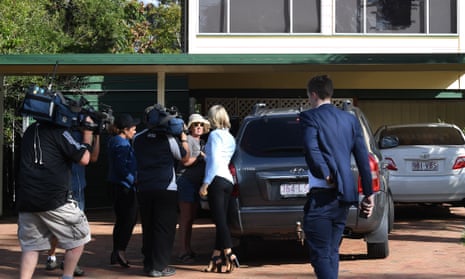Schapelle Corby’s return to Australia was a momentous day – for her, and also for the media pack that, in varying forms, has trailed her for the 13 years since she was arrested at Ngurah Rai international airport in Bali with 4kg of cannabis found in a boogie board bag. And so the two were entwined one more time.
Corby’s 20-year prison sentence was commuted by the former Indonesian president Susilo Bambang Yudhoyono in 2012 and she was paroled in February 2014. Her sentence expired on Saturday night. As she emerged in Kuta on Saturday afternoon wearing a veil over her face, she was sporting a T-shirt of William Tyrell, an Australian child who disappeared in 2014 – more fuel for the media frenzy.
Was this, those feeding the 24-hour news coverage wondered, an act of support for a cause she felt strongly about? Or was it just masterful trolling that she knew would inspire all these sorts of questions?
On Saturday night Corby got on a plane, but not the one the media expected. The Virgin Australia flight took off without her, after her name had been called several times on the airport public address system. She had switched to a Malindo Air flight – too quickly for the pack of journalists already booked on Virgin to follow suit.
Once she reached Brisbane airport in Australia, a convoy of cars departed before splitting into two groups as they were trailed by vans and, apparently, even motorcycles carrying media crews – conjuring images of depraved souls pursuing Mad Max across the desert in Fury Road.
One of the vans that Corby may or may not have been in then stopped at a KFC. The race to find Corby had now descended into a weird antipodean version of Where in the World is Carmen Sandiego, where instead of being led through exotic destinations across the space time continuum, we stop off in a fast-food chain in Brisbane.

Some of the journalists ended up at the Sofitel in Brisbane where Corby was possibly – or possibly not – staying. Others, in a desperate grab for something to talk about, collared random people at the airport and asked them about seeing Corby wearing a scarf. She looked tired, they said. She just moved really quickly, they said. But four, five, six hours after her Bali departure, no sign of the woman herself. We ended up with incredulous news reporters, tweeting incredulous statements about media overreacting – as they themselves lurked outside the home of Corby’s mother, Rosleigh Rose, in Loganlea, south of Brisbane.
The world has changed since Corby was arrested in Indonesia. Broadcast TV and tabloid magazines no longer reign supreme. Although their coverage has been intense, it all feels a little more muted and tired. Instagram, Facebook and Twitter are the real instruments of surveillance that monitor Corby’s every movement and interaction.
And for Corby, social networks have proven to be a weapon against the media itself.
On Saturday, a day before she was due to fly back to Australia, Corby joined Instagram. Then, she posted an Instagram photo of her dogs. And a video of her visit to the Bali parole office.
And next, she joined Snapchat.
Her recently created Instagram page attracted more than 100,000 followers in a few hours. In one post, she sent a picture of what appeared to be a journalist giving her the finger, which Corby captioned: “When the media don’t like their own pic taken.”
This article includes content provided by Instagram. We ask for your permission before anything is loaded, as they may be using cookies and other technologies. To view this content, click 'Allow and continue'.
Her celebrity status and the media’s obsession has not come from nowhere. There are racial subtexts to Corby’s imprisonment in that foreign land of Indonesia and how Australians view themselves in the world. Not to mention the insatiable national curiosity for a good crime story – it had everything: rival drug syndicates, missing evidence, a strange lack of video footage. All enough to create doubt – and all outside of Australia’s strict contempt of court laws, allowing speculation to breed.
But there is also a person at the centre of it all whose life has turned out vastly different to what she expected – and who has endured a lot. Corby’s sentence was commuted in 2012 partly because of her deteriorating mental health. She and her family have been the objects of relentless surveillance and scrutiny.
Corby’s security spokeswoman asked that her family’s privacy be respected. But as the TV networks continued their live crosses from the homes of her family into Sunday night, it seemed an unlikely prospect.
